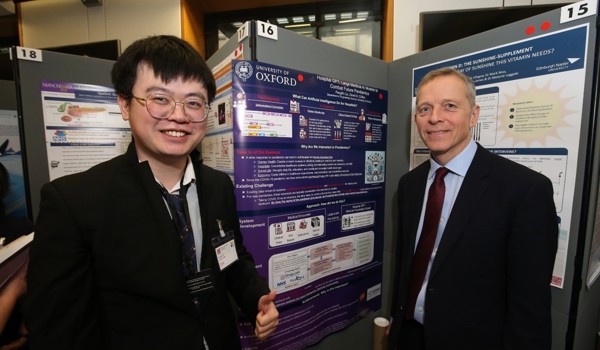11 Jan 2022
Winter Update

It's been a busy winter-time for the CHI Lab!
DPhil successes: First and foremost, congratulations go to Dr. Dani Kiyasseh and Dr. Grace Manley, who have graduated from their doctoral degrees with flying colours! Dani's thesis involved an exciting series of contributions to the ML literature on metalearning of various kinds for reasoning with biomedical data; Grace's thesis developed ML algorithms for use in monitoring the eruptions of volcanoes.
Warm welcomes: as the lab continues to expand, representing the exciting growth at the interface between ML and healthcare, Michaelmas term saw us delighted to welcome new postdocs Drs. Jannis Hagenah, Shadi Ghiasi, Taha Ceritli, and Peng Xu, to be joined shortly by Drs. Vinod Kumar and Yujiang Wang, with two more postdoc appointments currently being finalised. Just as warm is our welcome for our new doctoral students, Aidan Acquah, James Anibal, Ghadeer Ghosheh, and Zhiyao Luo. Please check out the web profiles for our new lab members via the [Team page].
Fellowships and prizes: In addition to those fellowships announced via earlier news articles, many congratulations go to Heloise Greeff for her appointment as a Junior Research Fellow (JRF) at Linacre College; to David Kohan Marzagao for his JRF at Kellogg College; and to Jenny Yang for her Marie Sklodowska-Curie Early-Career Fellowship funded by Horizon Europe as part of our European AI consortium, MOIRA.
Three cheers also for Yang Yang, Jessie Liu, and Chenyang Wang, who won the hackathon at the 2021 IEEE Healthcare Summit, which focused on predicting drug targets based on molecular structural data for COVID-19 medicines.
Hearty praise to Peter Charlton, who won the "Prize Paper Award" from the IEEE Engineering in Medicine & Biology Society (EMBS), for our article "Breathing Rate Estimation from the Electrocardiogram and Photoplethysmogram" [pdf].
CHI Lab research in the news: perhaps foremost in terms of public impact, Oxford University has produced [a showcase presentation] describing the university's response to the pandemic, where, alongside vaccine and public-health research, our CURIAL tool is described, which is used in Emergency Departments to help screen out patients who do not have COVID-19. The latter, led by clinical collaborator Dr. Andrew Soltan of Oxford University Hospitals, is currently under translation via the university's Translational Research Office for scaling up within the NHS and beyond.





